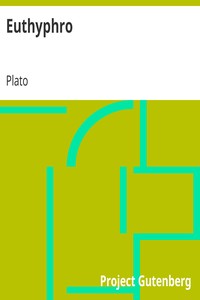Euthyphro by Plato
"Euthyphro" by Plato is a philosophical dialogue written in ancient Greece, likely during the late 5th century BC. It features the characters Socrates and Euthyphro, who engage in a discussion about the nature of piety and impiety in the context of Socrates' impending trial for impiety. The dialogue serves as a critical exploration of religious and moral concepts, examining what constitutes pious behavior and exposing the inconsistencies in Euthyphro's definitions of such
concepts. The narrative unfolds in the porch of the King Archon, where Socrates encounters Euthyphro, who is prosecuting his own father for murder. As Socrates seeks to understand the essence of piety, he challenges Euthyphro's assertions, leading to a series of definitions and redefinitions that ultimately highlight the complexity and ambiguity surrounding concepts of morality in religion. Socrates illustrates the flaws in Euthyphro's reasoning, demonstrating that what is considered pious may differ among the gods themselves, which complicates the idea that an action can be universally defined as holy or unjust. Euthyphro's inability to provide satisfactory answers leaves Socrates without the clarity he sought, culminating in a poignant exploration of the relationship between divine command and moral reasoning. (This is an automatically generated summary.)
Read now or download (free!)
| Choose how to read this book | Url | Size | ||||
|---|---|---|---|---|---|---|
| Read online (web) | https://sendtokindle.compellingsciencefiction.com/ebooks/1642.html.images | 84 kB | ||||
| EPUB3 (E-readers incl. Send-to-Kindle) | https://sendtokindle.compellingsciencefiction.com/ebooks/1642.epub3.images | 79 kB |
Send
to kindle email: |
|||
| EPUB (no images, older E-readers) | https://sendtokindle.compellingsciencefiction.com/ebooks/1642.epub.noimages | 78 kB | ||||
| Kindle | https://sendtokindle.compellingsciencefiction.com/ebooks/1642.kf8.images | 143 kB | ||||
| older Kindles | https://sendtokindle.compellingsciencefiction.com/ebooks/1642.kindle.images | 135 kB | ||||
| Plain Text UTF-8 | https://sendtokindle.compellingsciencefiction.com/ebooks/1642.txt.utf-8 | 70 kB | ||||
| Download HTML (zip) | https://www.gutenberg.org/cache/epub/1642/pg1642-h.zip | 75 kB | ||||
| There may be more files related to this item. | ||||||
Similar Books
About this eBook
| Author | Plato, 428? BCE-348? BCE |
|---|---|
| Translator | Jowett, Benjamin, 1817-1893 |
| Title | Euthyphro |
| Note | Wikipedia page about this book: https: //en.wikipedia.org/wiki/Euthyphro |
| Note | Reading ease score: 76.0 (7th grade). Fairly easy to read. |
| Credits | Produced by Sue Asscher, and David Widger |
| Language | English |
| LoC Class | B: Philosophy, Psychology, Religion |
| LoC Class | PA: Language and Literatures: Classical Languages and Literature |
| Subject | Classical literature |
| Subject | Piety -- Early works to 1800 |
| Subject | Socrates, 470 BC-399 BC |
| Subject | Philosophy, Ancient |
| Category | Text |
| EBook-No. | 1642 |
| Release Date | Feb 1, 1999 |
| Most Recently Updated | Jan 16, 2013 |
| Copyright Status | Public domain in the USA. |
| Downloads | 1981 downloads in the last 30 days. |
| Project Gutenberg eBooks are always free! | |

